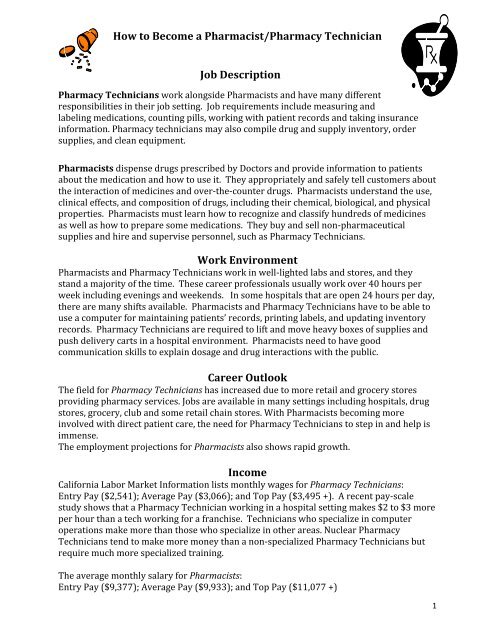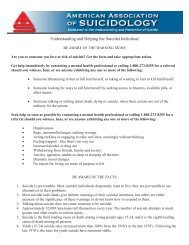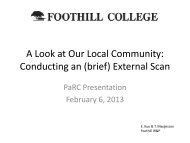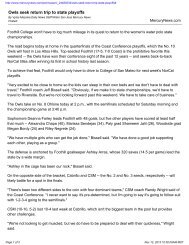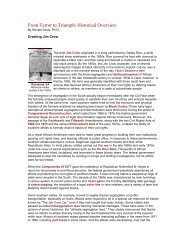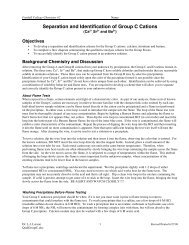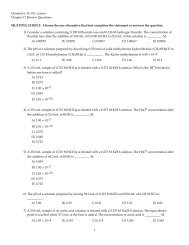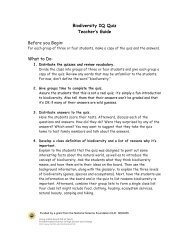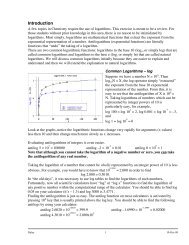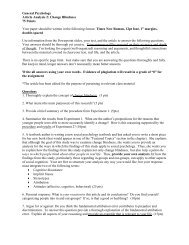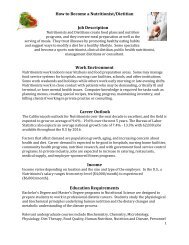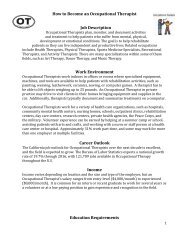How to Become a Pharmacy Technician - Foothill College
How to Become a Pharmacy Technician - Foothill College
How to Become a Pharmacy Technician - Foothill College
Create successful ePaper yourself
Turn your PDF publications into a flip-book with our unique Google optimized e-Paper software.
<br />
<strong>How</strong> <strong>to</strong> <strong>Become</strong> a Pharmacist/<strong>Pharmacy</strong> <strong>Technician</strong> <br />
<br />
Job Description <br />
<strong>Pharmacy</strong> <strong>Technician</strong>s work alongside Pharmacists and have many different <br />
responsibilities in their job setting. Job requirements include measuring and <br />
labeling medications, counting pills, working with patient records and taking insurance <br />
information. <strong>Pharmacy</strong> technicians may also compile drug and supply inven<strong>to</strong>ry, order <br />
supplies, and clean equipment. <br />
<br />
Pharmacists dispense drugs prescribed by Doc<strong>to</strong>rs and provide information <strong>to</strong> patients <br />
about the medication and how <strong>to</strong> use it. They appropriately and safely tell cus<strong>to</strong>mers about <br />
the interaction of medicines and over‐the‐counter drugs. Pharmacists understand the use, <br />
clinical effects, and composition of drugs, including their chemical, biological, and physical <br />
properties. Pharmacists must learn how <strong>to</strong> recognize and classify hundreds of medicines <br />
as well as how <strong>to</strong> prepare some medications. They buy and sell non‐pharmaceutical <br />
supplies and hire and supervise personnel, such as <strong>Pharmacy</strong> <strong>Technician</strong>s. <br />
Work Environment <br />
Pharmacists and <strong>Pharmacy</strong> <strong>Technician</strong>s work in well‐lighted labs and s<strong>to</strong>res, and they <br />
stand a majority of the time. These career professionals usually work over 40 hours per <br />
week including evenings and weekends. In some hospitals that are open 24 hours per day, <br />
there are many shifts available. Pharmacists and <strong>Pharmacy</strong> <strong>Technician</strong>s have <strong>to</strong> be able <strong>to</strong> <br />
use a computer for maintaining patients’ records, printing labels, and updating inven<strong>to</strong>ry <br />
records. <strong>Pharmacy</strong> <strong>Technician</strong>s are required <strong>to</strong> lift and move heavy boxes of supplies and <br />
push delivery carts in a hospital environment. Pharmacists need <strong>to</strong> have good <br />
communication skills <strong>to</strong> explain dosage and drug interactions with the public. <br />
<br />
Career Outlook <br />
The field for <strong>Pharmacy</strong> <strong>Technician</strong>s has increased due <strong>to</strong> more retail and grocery s<strong>to</strong>res <br />
providing pharmacy services. Jobs are available in many settings including hospitals, drug <br />
s<strong>to</strong>res, grocery, club and some retail chain s<strong>to</strong>res. With Pharmacists becoming more <br />
involved with direct patient care, the need for <strong>Pharmacy</strong> <strong>Technician</strong>s <strong>to</strong> step in and help is <br />
immense. <br />
The employment projections for Pharmacists also shows rapid growth. <br />
<br />
Income <br />
California Labor Market Information lists monthly wages for <strong>Pharmacy</strong> <strong>Technician</strong>s: <br />
Entry Pay ($2,541); Average Pay ($3,066); and Top Pay ($3,495 +). A recent pay‐scale <br />
study shows that a <strong>Pharmacy</strong> <strong>Technician</strong> working in a hospital setting makes $2 <strong>to</strong> $3 more <br />
per hour than a tech working for a franchise. <strong>Technician</strong>s who specialize in computer <br />
operations make more than those who specialize in other areas. Nuclear <strong>Pharmacy</strong> <br />
<strong>Technician</strong>s tend <strong>to</strong> make more money than a non‐specialized <strong>Pharmacy</strong> <strong>Technician</strong>s but <br />
require much more specialized training. <br />
<br />
The average monthly salary for Pharmacists: <br />
Entry Pay ($9,377); Average Pay ($9,933); and Top Pay ($11,077 +) <br />
1 <br />
<strong>How</strong> <strong>to</strong> <strong>Become</strong> a Pharmacist/<strong>Pharmacy</strong> <strong>Technician</strong> <br />
2 <br />
<br />
There are many benefits associated with working as a <strong>Pharmacy</strong> <strong>Technician</strong> or Pharmacist, <br />
including health insurance and price breaks on prescriptions. Some jobs offer shift work, <br />
which is appealing <strong>to</strong> many people looking for longer hours with more days off. Retirement <br />
plans are often offered, as are opportunities for promotion. <br />
<br />
<br />
Education <br />
<strong>Pharmacy</strong> <strong>Technician</strong>: <br />
Aspiring <strong>Pharmacy</strong> <strong>Technician</strong>s should choose accredited schools in order <strong>to</strong> ensure that <br />
they receive a quality education. According <strong>to</strong> the Accreditation Council for <strong>Pharmacy</strong> <br />
Education, the American Society of Health‐System Pharmacists (ASHP) is one agency that <br />
evaluates <strong>Pharmacy</strong> <strong>Technician</strong> training programs. <br />
<br />
Most <strong>Pharmacy</strong> <strong>Technician</strong> programs can be finished in less than 12 months, making this <br />
profession appealing due <strong>to</strong> its short certification time. <strong>How</strong>ever, some graduates of a <br />
<strong>Pharmacy</strong> <strong>Technician</strong> program earn an Associate of Science degree. The type of credential <br />
earned depends on the school and length of the program. A <strong>Pharmacy</strong> <strong>Technician</strong> who <br />
earns the Associate's degree may be more desirable <strong>to</strong> employers seeking <strong>to</strong> hire entry‐<br />
level employees. <br />
<br />
Students enrolled in a <strong>Pharmacy</strong> <strong>Technician</strong> program take a variety of courses in order <strong>to</strong> <br />
prepare for a career in the field. Typical classes include courses in medical and <br />
pharmaceutical technology, pharmaceutical techniques, pharmaceutical ethics and <br />
pharmacy law. Future <strong>Pharmacy</strong> <strong>Technician</strong>s learn how <strong>to</strong> calculate proper medication <br />
dosages. <br />
<br />
Before graduating from a <strong>Pharmacy</strong> <strong>Technician</strong> program, students must also complete an <br />
internship in order <strong>to</strong> gain real‐world experience in the field. Interns may work in <br />
pharmacies located in hospitals or retail establishments. They work under the supervision <br />
of experienced Pharmacists and <strong>Pharmacy</strong> <strong>Technician</strong>s <strong>to</strong> gain practical skills they will use <br />
in the workplace. <br />
<br />
<strong>Foothill</strong> <strong>College</strong> <br />
Certificate, <strong>Pharmacy</strong> <strong>Technician</strong> Program (nine‐month sequence of instruction) <br />
A.S. Degree, <strong>Pharmacy</strong> <strong>Technician</strong> Program (two‐year course sequence for degree and <br />
allows the student the ability <strong>to</strong> transfer <strong>to</strong> a four‐year program or <strong>to</strong> enter the job market <br />
with additional technical and theoretical background) <br />
<br />
<br />
Education <br />
<br />
Pharmacist: <br />
Students who want <strong>to</strong> become a Pharmacist can be expected <strong>to</strong> stay in college for at least <br />
six years. It is recommended that an undergraduate student major in biochemistry and <br />
then transfer in<strong>to</strong> a doc<strong>to</strong>rate program. The California State University system does not <br />
offer programs in <strong>Pharmacy</strong>, so a student should research the UC and private school <br />
systems.
<strong>How</strong> <strong>to</strong> <strong>Become</strong> a Pharmacist/<strong>Pharmacy</strong> <strong>Technician</strong> <br />
<br />
Undergraduate coursework should include Ana<strong>to</strong>my, Biology with lab, Calculus, Chemistry, <br />
English, Physics with Lab, and Sociology. <br />
<br />
Professional course work is taught through lectures, labora<strong>to</strong>ry work, and field experience. <br />
In graduate school, the following subjects will be mastered: Ana<strong>to</strong>my and Pathology, <br />
Pharmaceutical Chemistry, <strong>Pharmacy</strong> Administration, <strong>Pharmacy</strong> Law, Physiology, Poison <br />
Control, and Survey of Prescription Procedures. <br />
<br />
Some <strong>Pharmacy</strong> schools require applicants <strong>to</strong> take the <strong>Pharmacy</strong> <strong>College</strong> Admission Test <br />
(PCAT) and/or the <strong>College</strong> Entrance Examination Board (CEED) in high school or college. <br />
Entry in<strong>to</strong> pharmacy college is limited and competitive. Students need high grades and a <br />
strong background in biology, chemistry, physics, and math as well as good written and <br />
verbal communication skills. <br />
<br />
UC Davis <br />
M.S./Ph.D., Pharmacology and Toxicology <br />
<br />
UC Irvine <br />
B.S. Degree, Pharmaceutical Sciences <br />
M.S./Ph.D., Pharmacology and Toxicology <br />
<br />
University of California School of <strong>Pharmacy</strong>, UC San Francisco <br />
Doc<strong>to</strong>r of <strong>Pharmacy</strong> (PharmD), <strong>Pharmacy</strong> <br />
http://pharmacy.ucsf.edu/about <br />
<br />
UC Los Angeles <br />
M.S./Ph.D., Molecular and Medical Pharmacology (Medicine) <br />
<br />
UC Santa Barbara <br />
B.S. Degree, Pharmacology <br />
<br />
License <br />
To practice <strong>Pharmacy</strong> in California, a person must meet the Registered Pharmacist <br />
requirements of the California Board of <strong>Pharmacy</strong> provided in the Pharmacist Licensure <br />
Examinations. The licensing process is primarily composed <strong>to</strong> 2 examinations: <br />
<br />
1. North American Pharmacist Licensure Exam (NAPLEX) <br />
2. California Practice Standards and Jurisprudence Examination for Pharmacists (CPJE) <br />
<br />
<br />
Pharmacists Requirements for the license: <br />
• B.S. Degree in <strong>Pharmacy</strong> from an accredited school of <strong>Pharmacy</strong>; <br />
• Completed 1,500 hours of internship OR; <br />
• 1 year work experience as a registered Pharmacist in another state <br />
• Fingerprinted <br />
• License renewal every 2 years <br />
3
<strong>How</strong> <strong>to</strong> <strong>Become</strong> a Pharmacist/<strong>Pharmacy</strong> <strong>Technician</strong> <br />
<br />
<strong>Pharmacy</strong> <strong>Technician</strong> Requirements for the license: <br />
• A.A. or A.S. Degree in <strong>Pharmacy</strong> Tech or completion of accredited <strong>Pharmacy</strong> Tech <br />
training program; <br />
• Minimum of 1,500 hours as a <strong>Pharmacy</strong> Clerk OR; <br />
• 1 year and minimum of 1,500 hours performing duties as a <strong>Pharmacy</strong> <strong>Technician</strong>; <br />
• License renewal every 2 years <br />
According <strong>to</strong> the U.S. Bureau of Labor Statistics, the majority of states within the United <br />
States require <strong>Pharmacy</strong> <strong>Technician</strong>s <strong>to</strong> register with the State <strong>Pharmacy</strong> Board. Despite <br />
this fact, certification as a <strong>Pharmacy</strong> <strong>Technician</strong> is often not required. <strong>Pharmacy</strong> <br />
<strong>Technician</strong>s who choose <strong>to</strong> earn certification can take a national exam developed by the <br />
Institute for the Certification of <strong>Pharmacy</strong> <strong>Technician</strong>s (ICPT) or the <strong>Pharmacy</strong> <strong>Technician</strong> <br />
Certification Board (PTCB). <br />
<br />
Warnings <br />
If you are becoming a <strong>Pharmacy</strong> <strong>Technician</strong>, there are a few things <strong>to</strong> watch out for. When <br />
you begin a job, ask specifically if shift and on‐call work will be required. Some pharmacies <br />
require techs <strong>to</strong> work on call during the weekends, limiting the time that they can spend <br />
with their families. Be prepared, also, <strong>to</strong> be on your feet all day at work. Though most <br />
employers provide carpets <strong>to</strong> stand on, standing for 8 hours a day can cause back and neck <br />
problems. <br />
<br />
Sources of Additional Information <br />
<br />
Pharmacists & <strong>Pharmacy</strong> <strong>Technician</strong>s must be licensed through: <br />
California Board of <strong>Pharmacy</strong> <br />
625 North Market Blvd., Suite N219 <br />
Sacramen<strong>to</strong>, Ca 95834 <br />
(916) 574‐7900 <br />
<br />
Accreditation Council on Pharmaceutical Education (ACPE) <br />
20 North Clark Street, Ste. 2500 <br />
Chicago, IL 60602‐5109 <br />
www.acpe‐accredit.org <br />
(312) 644‐3575 <br />
<br />
American Association of <strong>College</strong>s of <strong>Pharmacy</strong> (AACP) <br />
1426 Prince St. <br />
Alexandria, VA 22314‐2541 <br />
www.aacp.org <br />
(703) 739‐2330 <br />
<br />
<br />
<br />
4
<strong>How</strong> <strong>to</strong> <strong>Become</strong> a Pharmacist/<strong>Pharmacy</strong> <strong>Technician</strong> <br />
<br />
American Pharmacists Association <br />
2215 Constitution Ave., NW <br />
Washing<strong>to</strong>n, DC 20037 <br />
www.aphanet.org <br />
(202) 628‐4410 <br />
<br />
Occupational Outlook Handbook <br />
2010‐2011 <br />
Available in the Career Center Library <br />
<br />
Eureka: The California Career Information System <br />
www.eureka.org <br />
Site Code: For current <strong>Foothill</strong> students only, please contact the Career Center <br />
<br />
Career Center Resource Library <br />
Room 8329 <br />
(650) 949‐7229 <br />
<br />
California Employment Development Department <br />
http://www.labormarketinfo.edd.ca.gov/ <br />
<br />
Bureau of Labor Statistics <br />
http://www.bls.gov/ <br />
<br />
<br />
5


